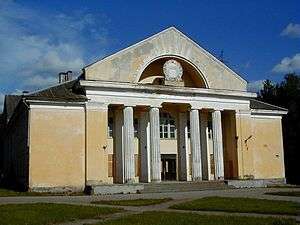Seda (Latvia)
Seda is a town in the Valka district of Latvia, with 1,500 inhabitants. It lies just 20 km from Valka and the Estonian border.
Understand

Seda is one of the youngest towns and an industrial centre built in 1953 for the workers of Seda peat marshes located nearby. The inhabitants were brought here from all over the Soviet Union. Built in the best traditions of the Stalin's style post-war period: with the same yellow cover and decorated with luxurious columns of a palace, only a monument of Lenin in front is missing. In Russia common, but for the Baltic States the sight is unusual. Traces of decline are hidden by external cosmetic repairs. The locals (mostly Russian-speaking) looks about the same as anywhere in the Urals, having said that without any enthusiasm.
Get in
There are three trains and several buses a day from Riga, going to Valga, Estonia. They all stop in Seda, see 1188.lv.
Get around
Seda is so small, anything beyond walking is largely overdrawn.
See
- Seda itself is a monument of Stalinist architecture. It's a perfect place for people seeking Soviet nostalgia. The design and structure of the town centre is a wonderful example of the monumental architecture of 1950s Stalinist times, which has not been ruined by any new building yet.
- 🌍 Narrow-gauge peat enterprise. In 2008, the status was unknown. The depot is located to the northeast of the centre. There you can see old wagons and other equipment. If active, take a trip on a narrow-gauge train going to the peat marshes.
- 🌍 Peat bogs. This is the hidden gem of Seda, and a dream for nature lovers. This former peat extraction occupies an area of more than 10 km². In the recent past, there have been sluggish attempts to turn this huge swamp into an object of nature tourism; a pedestrian route has been laid, observation towers have been built, one of which is 2 km from Seda, at the coordinates indicated with this listing. The trail to the tower is a densely peat-strewn road and one is not equipped with signs. In a dry state it is passable for cars. Further on, one will most likely have to walk. In general, this area is almost completely untouched by the man, but Estonian bogs are perfect for tourists; at least when having GPS or a map.
Do
- Walk around those three streets – it will not take more than an hour.
- Seda nature trail (Sedas daba taka (ekotaka)). free.
Buy
In the central square there is a small shop with unknown opening hours.
Eat
Drink
Sleep
Check out the observation towers in the Peat bogs, if you have sleeping bag and mattress. They might have a roof and thus be sufficient for an overnight stay.
Otherwise, check out the options available in the nearby town Strenči.
Go next
- Strenči – Just 5 km southwest. Features a mental hospital in a nice surrounding.
- Valka – A unique town on the Estonian border, which runs through the town centre, creating Valga on the other side. It is close to regaining the status of an important cultural centre.
- Smiltene – Features a manor, some castle ruins, and a watch tower over the surrounding area. Not very interesting, but quite cosy and slightly larger than Valka, and not far from the Pskov highway.